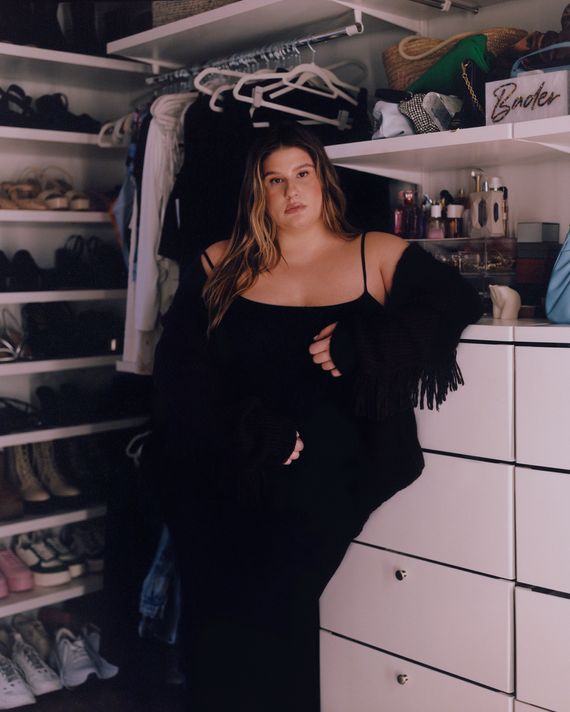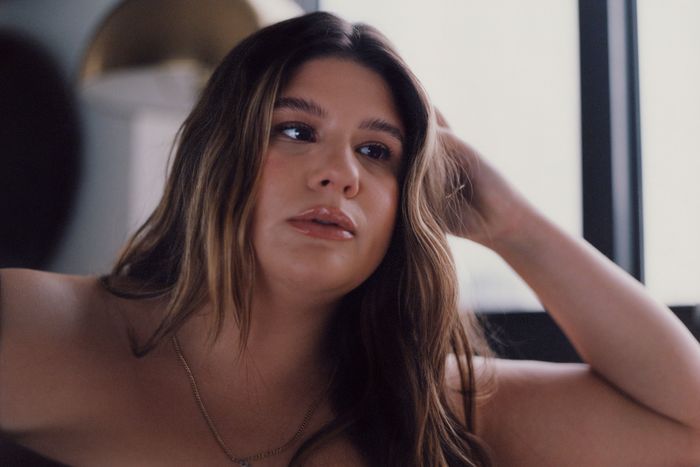
I started posting on TikTok in September 2020. I’d lost my job in the music industry a few months earlier, and my dad, who works in women’s fashion, encouraged me to join a small agency as a curve model. It was fine, but I still had all of this downtime and felt like I was losing my mind.
So I started messaging influencers, asking to work for them for free, which is when I came across the curvy fashion side of TikTok. I was watching these girls who looked like me, or were bigger than me, doing fashion hauls, and I noticed that they only showed the good: clothes that fit, clothes they looked amazing in. That was fine, but for me, trying on clothes has never been fun. I’ve always been a curvier girl — I was a size 10-12 growing up — and my mom literally had to force me to go shopping because I hated it so much.
One day, I got a package of clothing in the mail, I think from either Nasty Gal or Pretty Little Thing, and I decided to make a video of myself trying everything on. The clothes were based on my measurements, and in the video I was laughing in the mirror, both at myself and how bad most of these clothes looked like on me. It was for fun; I never thought anyone other than my friends would see it. But that video went viral. I mean, it was viral in my mind — I don’t even know if it got 10,000 likes. Still, I was sending it to friends like, “Wait guys, what’s happening?”
That’s when I started making what I call “realistic clothing hauls.” I’d try on clothes that were supposed to be my size and just poke fun at how ridiculous they looked. The videos went nuts; my comment section was full of people saying things like, “Oh my God, I feel this too. Wow, that’s so true — that’s how I’ve always felt in a dressing room.”
I started uploading around once a day. The hauls were the most popular thing, but sometimes, I’d sprinkle in more personal videos. I’d talk about my anxiety, or my struggle with binge-eating, something I’d started dealing with right before the pandemic. I’d gained a bunch of weight — in part because of the binging — and by the time I lost my job in 2020, I was a size 14-16. To be honest I was in denial about it for a while: I was still walking around in clothes that were too tight because I did not want to shop for new ones. So in a way, these haul videos helped me take something frustrating and add a bit of humor to it.
Over the next three months my audience continued to grow. People were coming out of nowhere. By January 2021, I had millions of followers, and when I’d call out these famously thin-centric brands, they’d reach out to me. They’d gift me clothes, and some of them even asked me to consult for them. Right now I’m consulting with Victoria’s Secret Pink to help it with fit and expand sizing. But as my following grew, I started getting haters. A lot of it was just negative comments from random men, or people that were just like, “You’re fat. We don’t want to see this.” I’d get a lot of “fat bitch,” “fat whale.”
But I also started getting backlash from the body-positive community. Last year, I worked with Revolve to expand its size chart up to a 3X. We changed the whole size chart, but even then the whole plus-size community on TikTok went against me, saying things like, “I can’t believe she’s getting credit for this and she’s only going up to 3X.” And so I went back to Revolve right before the launch, and we ended up pushing to a 4X at the very last minute. Still, people in the community weren’t happy. “You’re not even talking about brands that are truly size inclusive,” they’d say. “Why are these publications and people looking at you as this great, plus-size creator?”
Another reason why certain people in the plus-size community aren’t on my side is because I will openly talk about being unhappy with my body. When I say “I’m not the happiest right now,” or “I don’t feel great,” people will say: “Remi’s fatphobic.” I’ve even been criticized for having too many skinny friends. But I’ve gained probably 80 pounds over the past few years — I’m only 27 and I’m getting a lot of health problems.
I started all of this without having any plan or thinking it would go anywhere, and now I’m supposed to be the face of body positivity, or the face of the plus-size community, or whatever people want to say. I’m considered too big to be midsize, but the plus-size community says I’m not big enough to have a say in things like size charts. I keep thinking, Where do you want me to be and what do you want me to say? Because I really don’t know the right things to say anymore.
All of this began to affect my mental health. About a year into all of this I finally realized that I was getting into a darker place, that my binge-eating was starting to get worse. That I needed help. I was like, I want to take a break from social media, but I can’t. I need to post every day.
Growing up, my parents always told me that I needed to lose weight. My dad would offer me money to lose weight in a fun way, like: “If you lose this amount of weight by this time, I’ll give you this much money.” Sometimes he’d say things like, “You’re never going to get a boyfriend if you don’t eat slower.” My mom grew up with people telling her she had to be skinny, and I was always on a diet because she was always on a diet. It was almost a fun thing we did together.
In 2019, I was super stressed at work. I had a roommate at that time, and at some point, I started coming home from work late, and I would order food, close my door, turn off my phone, sit on the floor, and just eat. And then after, I would cry about it, because I would eat such an extreme amount. It got a little better when I was living with my family during COVID, but then I moved back to the city, started living alone again, and it just got worse and worse. During my first year of TikTok, I just let myself go, in a way: I literally only cared about how the videos were doing. I didn’t have a full team, I just had my agents. I was managing things myself and had no time to work out, to do therapy, to watch an enjoyable TV show, to go for a walk, to eat at the right time. So then I would just binge at night.
So in the summer of 2022, I checked myself into an eating-disorder treatment center. Every day would start with sessions — art therapy, body image, nutrition — and then you’d have a meal together. Everyone had different food, because everyone had different eating disorders. They did this thing where before you eat, you’d go around the room and rate your hunger and anxiety level, and talk about your intentions for the meal. You’d take three deep breaths, and then you’d eat. Eating together was the most helpful part for me; my bingeing always gets worse when I’m alone.
The majority of people stay at a treatment center for months and months until they get way better. I gave myself six weeks. By the end of that time, I knew I wasn’t ready to leave, and they wanted me to stay longer; they told me, “You can’t really just take a break and come back.” But I was leaving for Europe for work the next day. And while I was at the center I couldn’t have my phone — I actually liked that, but posting on TikTok is my business, so I told myself I had to get back to work. I kind of didn’t have a choice.
During the first couple weeks out of treatment, I was feeling okay. I thought Wow, this must have worked. But then I went to all of these fashion weeks, and while I was there I realized literally no one cared about inclusivity: I was scanning each show to see who brought out plus-size models or had any diversity whatsoever, and there was barely anything. I remember being in Paris, at parties and events, and being struck by the realization that I am the biggest girl around. The only larger person in the room, period. I thought, Why am I here?
When you leave the center you’re supposed to have a therapist and an eating coach to meet with back home. But I never did that. I still haven’t done that. And by the time I got back to New York, once I got back to reality a little bit, I slowly started bingeing again. I’ll never know the exact reason why I relapsed, but I will say that it’s hard being a bigger woman in fashion. There was a moment during that Fashion Week where I was trying not to cry because I was going down these stairs — there were like a million stairs at the Revolve Gallery or something — and my knee kind of went out, and I just felt so frustrated and heavy kind of walking down the stairs. I just thought: I’m almost hurting my body.
I’m supposed to be promoting self-love, but I’m just not going to pretend I love my body all the time, which is what I’m expected to do. I don’t like being called body positive.
I can’t really say, “Wow, social media ruined me.” I was in a worse place before I was on TikTok, and I do feel like social media has done more good than harm. I feel like I’ve got a lot of my confidence back. After Paris Fashion Week last year, I went back to making realistic-hauls videos and tried to stop reading the comments. I have all these people that say I help them, but really they’re helping me. But the sad part is that if a video is blowing up and I’m gaining followers then I’m in a great mood. Even my boyfriend said the other day, “Oh, I hope your video does well. That’ll be good for me.” I’m like, “Why?” And he goes: “Because you’re in a better mood when they do.”
I want to keep doing what I’m doing. Brands have actually made changes, whether that’s putting larger girls on their website or extending their sizes. As for my weight, yes, I’m frustrated by it, but I also don’t want to try to lose weight because that’s what started my binge-eating in the first place. And I want to get better, but that’s hard in the fashion world. And now, I’m also thinking about my followers — what would I do if I lost all this weight? Or if I gained more? It’s about me, but it’s about everyone else, too.


